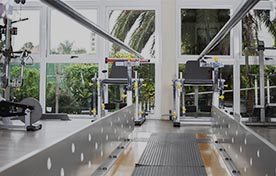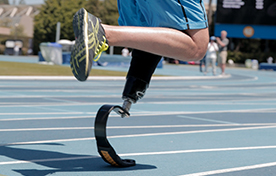Caregivers Can Make a Difference
– by John Peter Seaman, CP, CTP
Listed below are some things you, as an amputee’s caregiver, can do to help minimize the frustrations that are sure to be encountered.
Be a second set of eyes and ears when meeting with a prosthetist.
During an amputee’s initial visits with a prosthetist, many new topics will be discussed, procedures will be reviewed and recommendations will be made. Also, new terminology will be presented by the prosthetist in regard to a prosthesis and its use. Often, much of this information will not not be initially retained by an amputee, for a variety of reasons. The solution, as a caregiver, is to participate in the amputee/prosthetist encounters so that you can listen, observe and absorb what the prosthetist shares with the amputee, especially in the early stages of the prosthetic fitting process. Don’t be afraid to ask questions (and take notes) if clarification is needed to enhance information retention.
Maintain a history of events for the amputee.
Because so many things can happen during a relatively short period of time, it makes sense to maintain a list of events along with healthcare providers’ names, dates of important events (surgeries, appointments, when certain medications were started or stopped, etc.) and locations where procedures were conducted(hospitals,rehab facilities, etc.). Also, as the rehabilitation process continues, you should document when the amputee was fitted with his/her first prosthesis and any subsequent prosthetic devices, such as socket replacements, or consumable products such as liners, suspension sleeves or socks. Sometimes this type of information can be useful to future healthcare providers as the rehabilitation process progresses, especially for example. if the amputee changes prosthetists, which sometimes happens.
Provide encouragement to the amputee.
Following amputation surgery, an amputee may experience mild or short term depression, which can result in a lack of motivation. This is not unusual; after all, the amputation of a limb is often viewed by an amputee as being similar to the lost of the loved one. If depression is experience it will hopefully be short-lived and the amputee will work through it with your help. Receiving encouragement and understanding from caregivers during this experience can be very beneficial to a new amputee. However, if a state of depression becomes prolonged or intense, professional counseling should be encouraged.
Exercise patience when interacting with the amputee – to a point.
As a caregiver, being patient with an amputee can sometimes be tricky as you try to strike a balance between being too patient versus being too pushy as you play the role of a motivator. You should understand that it will take new amputees longer to do many ADLs due to learning how to deal with the amputation and use of a prosthesis. So for example, when you are preparing to go to an appointment with the amputee’s doctor or prosthetist, you need to allow more preparation time before leaving home and more time for getting out of the car and into the office once you’ve arrived at your destination. But at the same time, you need to set and agree to time management expectations with the amputee so as to minimize frustrations.
Provide physical assistance to the amputee only when absolutely necessary.
New amputees will need to learn several repetitive procedures that are required when using a prosthesis. Some of these tasks maybe easily be learned and executed by the amputee right from the start. However, early on, an amputee may need assistance in performing certain functions so as to achieve a more successful outcome. When this occurs, as a caregiver, you might need to provide a higher level of assistance early in the rehabilitation process than might be required later on. But as time goes by, the amputee should be encouraged to try to learn how to independently perform as many daily tasks as possible that are required when using a prosthesis.
Research questions or issues regarding prosthetics.
New amputees have to learn many things about using a prosthesis successfully, but never fear, we’re not talking “rocket science” here. An amputee’s prosthetist should provide verbal and/or written instructions on what needs to be done on a daily basis to become a successful prosthetic user. If any questions should arise, the prosthetist should be your first point of contact. However, as a caregiver, you should know that there is an abundance of support information available on the internet for those those who have access and the desire to search it out. Remember, your amputee family member or friend is not the first one to go through the experience of an amputation and the process of learning how to use a prosthesis. If any unanswered questions arise, there are many sources of possible answers out there waiting to be found. The Amputee Coalition is an excellent place to start; just call 888/267/5669 visit amputee-coalition.org.
Seek out additional assistance.
If you find that a new amputee is having difficulty getting motivated to use a prosthesis, it may be beneficial to seek out a peer counselor. A peer counselor
is a fellow amputee that has received specific training qualifying them to provide support to other amputees. They can share their experience with amputee while physically demonstrating what they can do as a user of a prosthesis. Contacts with peer counselors can be arranged through the Amputee Coalition, your prosthetist or possibly other local healthcare providers.
If you have any questions or comments regarding the content of this article, please contact the author at jpseaman@aol.com.
Disclaimer: The following information is provided and owned by the Amputation Coalition of America and was previously published on the website http://www.amputee-coalition.org or the Coalitions Newsletter, inMotion.








